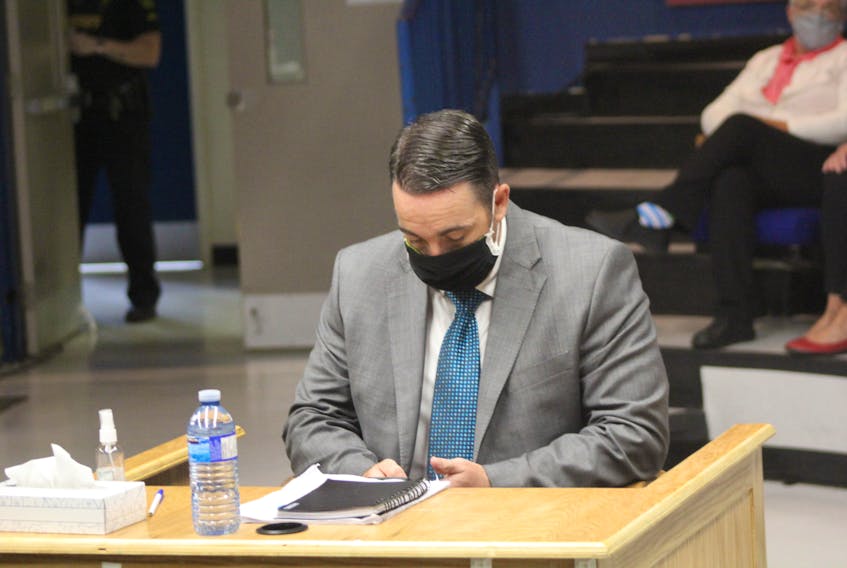ST. JOHN'S, N.L. — The jury in the sexual assault trial of RNC Const. Doug Snelgrove left the courtroom to begin verdict deliberations Thursday afternoon after hearing detailed instructions from the judge on the laws that must guide them.
In particular, Justice Garrett Handrigan spent close to half an hour explaining the section of the law a previous judge presiding over the case had omitted, resulting in the province’s Court of Appeal and the Supreme Court of Canada both ordering that Snelgrove be retried.
Snelgrove, 43, is charged with sexually assaulting a woman while he was on duty as a police officer in St. John’s in December 2014.
The woman, now 27, told the court she had been downtown with friends when she realized she had become too drunk and wanted to go home and sleep. She headed toward Water Street to hail a cab when she came across a parked RNC car. The officer inside rolled down the window and asked her if she was OK and if she needed a ride.
“I thought it was safer to go with a police officer if he was offering me a ride,” she testified, explaining her memory of the night was patchy.
Outside her apartment, the woman said, she couldn’t find her keys and the officer offered to drive her to a friend’s house. She wanted to stay and he managed to open a window to allow her to crawl inside.
The woman said she opened the door for the officer and remembered kissing him before sitting down on a loveseat.
“The next thing I remember, I came to and he was having anal sex with me,” she said. “In the drunken state I was, I don’t know if I gave consent or not.”
Snelgrove testified he was in his vehicle, writing a report when the woman approached him and asked for a ride home. Snelgrove said he declined and told her that he was too busy, before giving in and opening the door to let her in the car. He told the court the woman smelled faintly like alcohol, but seemed perfectly sober.
The police officer testified he had wanted to “get rid of” the woman and leave and doesn’t know why he went into her apartment. The woman kissed him and took her clothes off before agreeing to have anal sex when he asked her, he said.
Snelgrove went to trial on the sexual assault charge in 2017 and was acquitted by a jury before the Crown successfully appealed. Snelgrove appealed to the Supreme Court of Canada, but was turned down.
Details of the previous trial were banned from publication while Snelgrove’s current trial was ongoing, until the jury was sequestered.
Both courts determined the original judge had made a mistake by not explaining to the jury a section of the law regarding consent; specifically, that a person cannot legally give consent to sexual activity to someone in a position of power, trust or authority if that someone abused their position to induce it.
“Let me put that in the context of this case for you,” Handrigan told the jurors Thursday afternoon. “If you find that (the complainant) consented to the sexual activity that occurred between her and Mr. Snelgrove, you must find there was no consent if Mr. Snelgrove induced her to engage in the sexual activity by abusing any position of authority in which he stood towards her.”
The judge told the jurors they should take it as a given that Snelgrove was in a position of authority over the woman, given he was on duty in a police uniform and a marked police vehicle. When considering whether or not he abused his position, Handrigan told the jurors to consider the woman’s testimony that Snelgrove had opened the car door for her to get in; that he had responded to a compliment from her in the vehicle by telling her that she was cute and pretty; that he had not followed the accepted RNC procedure of informing the communications desk that he was transporting a lone female; that he drove her home despite it being outside his assigned patrol area; that he had helped her get into her house when she couldn’t find her keys; that he had taken no notes of his encounter with the woman; and that he had gone inside her apartment and had testified he doesn’t know why.
Inducement can be overt and direct or can result from subtle enticement and understated influence, the judge explained. In any case, the jurors must be satisfied beyond a reasonable doubt that it happened.
Just because the complainant — or any complainant of sexual assault — didn’t resist or “put up a fight” doesn’t mean there was consent, Handrigan said.
There is no legal consent in situations where a person is severely intoxicated or unconscious, Handrigan explained, telling the jurors that if they were satisfied that was the case with the complainant, they must find Snelgrove guilty. Handrigan advised the jurors to take into account the nature of the contact between the woman and Snelgrove, her words, gestures and other indications from the night in question when deciding whether or not the woman had been severely intoxicated.
If the jurors determine Snelgrove did not abuse his position and that he honestly believed the woman was consenting in a sober state after taking reasonable steps to determine that was the case, they can find Snelgrove not guilty, the judge explained.
“Keep an open mind but not an empty head,” Handrigan told the jury, as he often does.
Once he dismissed the two alternate jurors chosen at the start of the trial, Handrigan sent the jury into a private room to begin their discussions.
Earlier in the day, the Crown and defence lawyers presented their closing arguments to the jury. The complainant was not so drunk that she was unable to walk or call a friend on her cellphone or give Snelgrove directions, defence lawyer Randy Piercey argued, and the woman had agreed to the sexual acts. Snelgrove had not abused his position of authority, Piercey continued, since the woman had been the one to initiate the acts.
Piercey reminded the jury they were deciding a legal issue, not a moral one.
“What he did was really stupid,” Piercey said. “But if stupid meant a conviction, we’d all have criminal records.”
Prosecutor Lloyd Strickland argued Snelgrove had seen an intoxicated young female and an opportunity to use his position to entice her into sexual acts.
“Perhaps you should step back and look at their starting points,” Strickland said. “In January 2015 (the complainant) tells (police) she was assaulted by an RNC officer. Sgt. (Tim) Hogan looks at the police cars and lo and behold, there was a police car at her residence that night, signed out by Doug Snelgrove. Lo and behold, his DNA is on the loveseat. That’s her starting point — there’s some substance to it.
“What’s his starting point? He admitted he disrespected his uniform. If you were his superior at the RNC, how credible would you take him? If you were his spouse, would you believe him going forward?”









